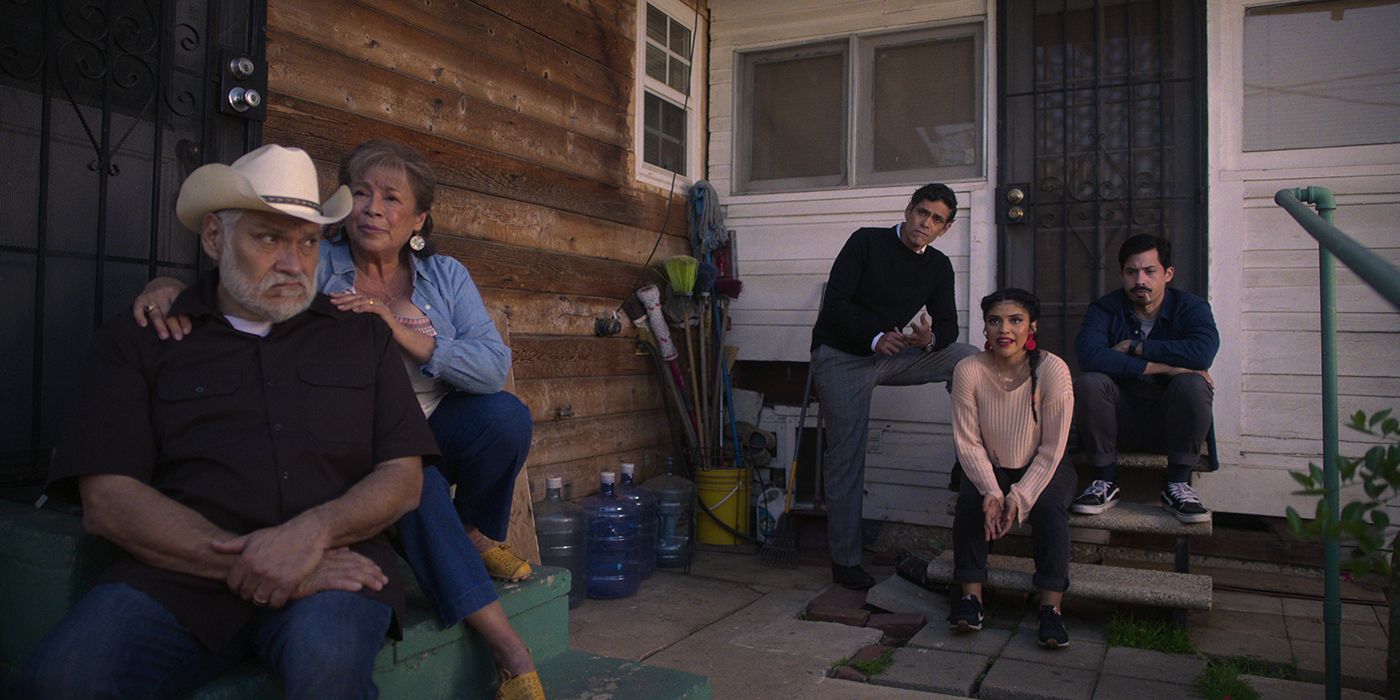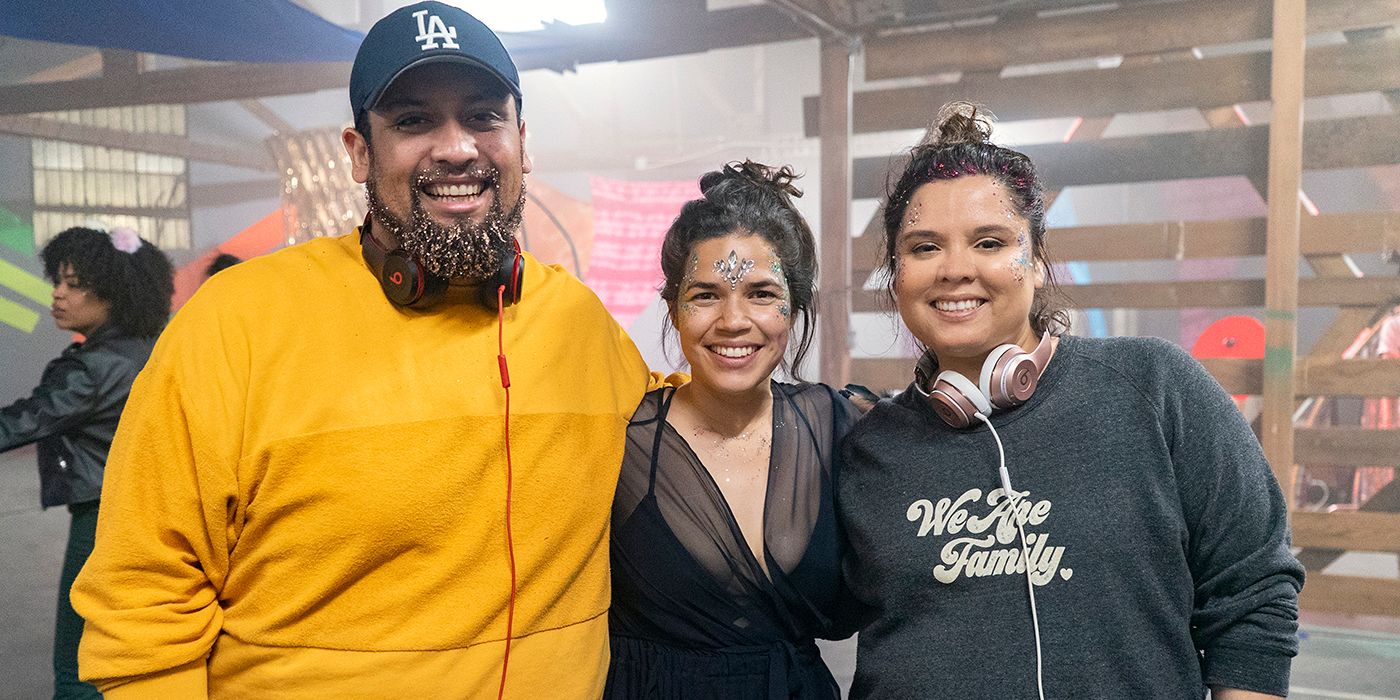Gentefied has never shied away from tackling uncomfortable or difficult subjects. The title of the Netflix dramedy, which returns on November 10 for its second season, refers to the concept of gentrification and how it affects the Morales family in particular. But the story never hit harder than in the season 1 cliffhanger, which saw patriarch Casimiro (Joaquin Cosio, The Suicide Squad) - affectionately known as Pop - being taken away by ICE.
Now that the Morales cousins have to band together as a family in the face of an unimaginable crisis, the show's creative team also had to come together to find a new and insightful way to tackle a storyline that all too often gets glossed over for melodrama. Between balancing the tension of the case result with the daily humor of the episodes and introducing new characters with a fresh take on the situation, such as passionate pro-bono attorney Melinna (played by Melinna Bobadilla), the executive producers discovered a nuance approach not many shows have taken before.
Marvin Lemus, America Ferrera, and Linda Yvette Chavez spoke to Screen Rant about how they mapped out the season with the hopes of honoring members of the Latino community who are fighting for their families.
Screen Rant: Marvin, Pop's impending immigration case is a big factor, and it's probably a more nuanced take than we normally see when it comes to the undocumented. Can you talk about the research that the writers you had to do and how you wanted to approach the story?
Marvin Lemus: Early on, one of the first things that we came to was definitely wanting to skip and avoid having it be trauma porn. I feel like that's something that we tend to see when it comes to immigration stories. They're stories that need to be told, but it tends to be the only one.
We wanted to see what it looks like going through the legal battle. What is that when you're in limbo, and how does it affect the whole family? We had extensive conversations with an immigration attorney [who] was able to help us throughout the season to figure out: What are the benchmarks? What does that process look like? What would Pop’s case [look like], and how long does it go on? And what does every court case look like and sound like, and what petitions does he have to file? What paperwork? All the different things that Pop and the family, by association, are having to deal with. We wanted to just reflect that because we feel like that's a part of the family separation that we don't get to see very often.
We feel that cloud that's hanging over everybody, but we still want to feel that brown joy and be able to see everybody laughing and creating fun new memories and finding new love. But in the background, there's that noise and that impending [feeling of] potentially having the rug pulled out from under you. And we wanted to really capture that.
America, you directed the first 2 episodes, which really set the tone for the season. What aspects or themes of the Morales family story did you want to bring to the forefront?
America Ferrera: Marvin, Linda, and I did so much talking before the cameras ever rolled. I think we had that on our side this time around, and we were three of the four directors of the season. What was great was that [for] everything, just starting with the season themes and concepts, we were all in conversation with each other. What that meant when the cameras were rolling was that visually, character arc-wise, color-wise, shot-wise, we had so many conversations about what mattered and what was important.
The opening shot of episode 1 mirrors the opening shot of episode 8 in this way that we had talked about from the beginning. This is about Pop's journey through his time in limbo, as Marvin was saying, and we had the opportunity to talk about all of it; about how we were setting up Pop's journey, but also how this season was going to evolve each of the characters' journeys.
For instance, for Ana [Karrie Martin Lachney], season 1 was a lot about her getting to taste what it felt like to have some success as an artist, but at the cost of a little bit of compromise: compromising herself, losing her relationship, losing some trust that she had in the systems that she thought were going to help give her everything she wanted. And we had conversations early on about how we don't need to really even see that again, and we explored that.
So, what's the next evolution of Ana's arc? And what I love is that it feels like it's gonna be that, right? There's the setup that she's going on an interview for this job and it's, again, "Uh oh, is she going to pick big corporate America or her artistic integrity?" and her storyline goes in a whole other direction with that new character that we brought into this season.
It was so wonderful to get to, from before a camera even rolled, really spend so much time with Marvin and Linda discussing the character arcs and themes. The visual themes were a really big part of it this season, which I hope you see in the first two episodes - but you definitely see throughout the season how everything got taken up many notches this season visually.
Speaking of new characters, Melinna Bobadilla really gives it all she's got as the lawyer working on Pop's case. Linda, how do you balance her earnestness with the harsh cavalier attitudes of others?
Linda Yvette Chavez: Melinna was someone that we thought of early on to show the lawyers in our community that are fighting for our community. They're fighting for our families; fighting to keep families together. Marvin actually had a friend, but in general, I think there are so many activists who are out here, who people may assume are not lawyers or are not doctors; assume that they're not higher education like Lidia.
But Melinna is a lawyer, and she's out here. She's hood and she's Latina and she's Chicana. That mirror scene, we talked about towards the end, we were so excited because we were like, "We want to show up for these Latinas!" What do they call them? LAW-tinas. Honestly, so many are in it because their hearts are very deeply in the cases that they're pouring into. They're often underpaid, often are doing things pro-bono, often are just working themselves to death - and we wanted to show the badasses that are in our community showing up for our families.
I think that particular scene for us was a love letter to them because we wanted to show, "We see you. We see the work that you're doing." One of the moments where I cry every time is in the last episode when the whole family is hugging, and then someone reaches out for Melinna's hand. Talking about that moment always makes me cry because you can see in her face what it means to her.
All 8 episodes of Gentefied's second season begin streaming November 10 on Netflix.


